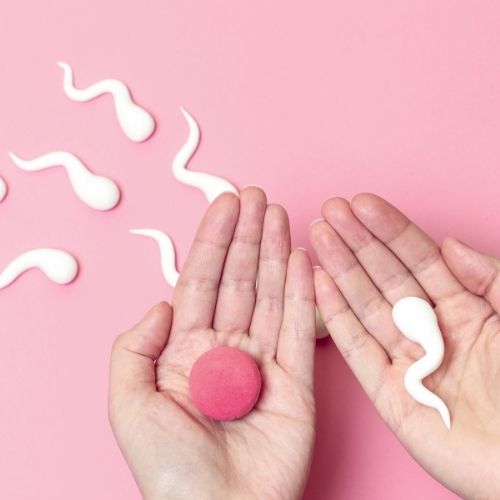It’s very common not to experience any symptoms of pregnancy after artificial insemination. While some women experience early pregnancy symptoms in the weeks following IUI, it’s not a sure thing! This post contains affiliate links for your convenience.
Going through fertility treatments is an experience I’ll never forget. There is constant worry, excitement, heartbreak, jealousy, anger…and well, really every emotion!
Unless you’ve been through a two-week wait yourself, it’s hard to explain the journey that infertility takes you on. You suddenly start seeing pregnant women everywhere, happy couples with infants in strollers, and feel like there is an ache in your heart.
You also become very aware of everything your body does, and it’s a cruel mind-game that doesn’t end. Is that thick cervical mucus? Is this mild cramping from implantation, or a bad burrito?! Could it be an early sign of pregnancy or is it all in my head?!
I conceived my oldest daughter through intrauterine insemination, or IUI. Everyone has a different reason for turning to fertility treatments, but you can read more about my family’s story here.
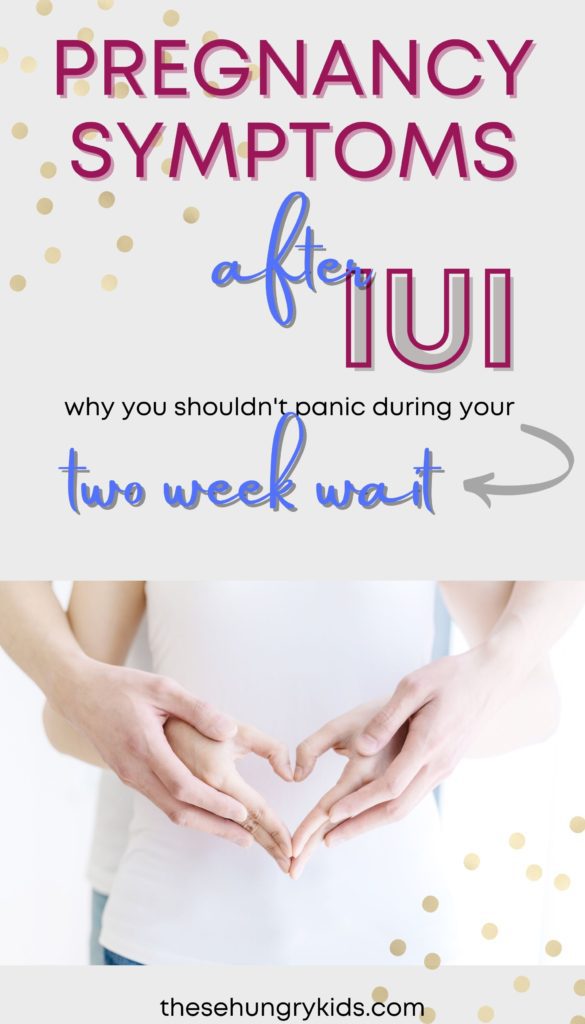
Intrauterine insemination (IUI)
The IUI procedure increases the chances of getting pregnant each month. Getting pregnant is not guaranteed with an IUI, but it does increase the pregnancy rate.
Artificial insemination is typically done by a reproductive endocrinologist or a fertility specialist. No anesthesia is required and it is typically performed right in the office.
With an IUI, sperm is placed into the uterus through a small catheter around the time of ovulation. The fertility doctor will look at past ovulation, hormonal changes in your blood work, and ultrasounds to determine when the egg is most likely to be passed into the Fallopian tubes.
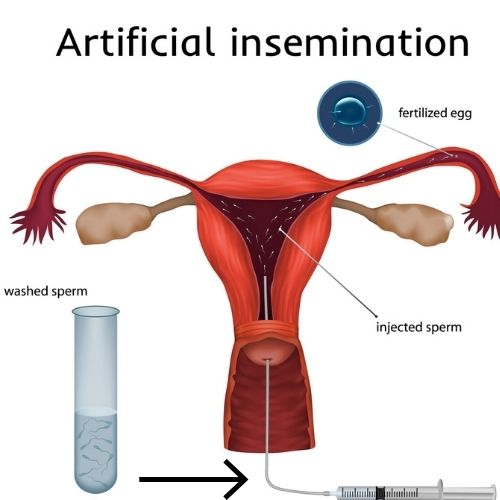
Intrauterine insemination takes just a few minutes and is relatively painless. You may experience a little cramping or discomfort, but this is very temporary.
You may or may not need fertility medications with an IUI. Sometimes medications are given to help thicken or thin the uterine lining, to help follicles grow, or to help follicles release an egg into the Fallopian tube. Your regimen and protocol will be determined by your physician based on the reason you struggle to get pregnant.
Some women are able to do natural cycles. In this case, your doctor will determine when you are ovulating by measuring hormone levels, and measuring ovarian follicles through ultrasound. Your provider may also recommend using home ovulation predictor kits. You may not use any fertility drugs with a natural cycle, but it does increase the chances of pregnancy by introducing the sperm directly into the uterus.
Related: Ways to Make Pregnancy More Comfortable
The difference between IUI and IVF
Intrauterine insemination is different from in vitro fertilization (IVF). With IUI, egg and sperm meet in the uterus. The semen sample is washed to give a concentrated sample right into the woman’s uterus.
With IVF, the egg and sperm meet outside of the body. The eggs are retrieved by a fertility specialist and the fertilization happens in a lab. Once the egg and sperm start dividing, they are placed back into the woman’s body in hopes that the fertilized egg implants in the uterus. This is called an embryo transfer.
Doing an IVF cycle is typically more expensive than an IUI cycle, but it does have higher success rates.
Having no symptoms after IUI is totally normal
The nerves and excitement after IUI can make you think everything is a sign of pregnancy! It’s totally unfair, but oftentimes early pregnancy symptoms and symptoms of menses, or getting your period, are similar.
There are tons of success stories of people having no symptoms for 10-14 days after their IUI and feeling totally normal. In fact, many people feel no symptoms of pregnancy until they are 6-8 weeks along.
Whether you conceived via IUI or through good ole’ fashioned adult activities, it’s common not to feel any symptoms of pregnancy until you are several weeks (or months) along.
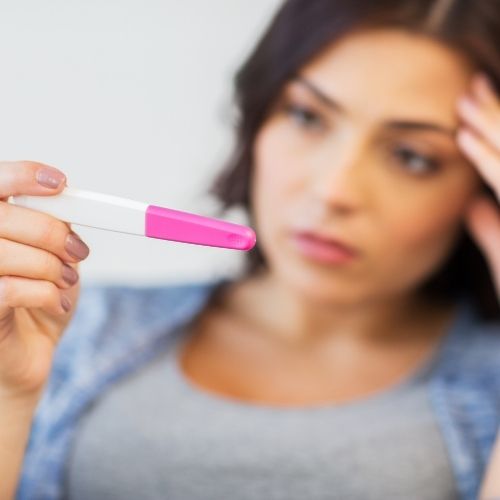
Early pregnancy symptoms
The most common symptoms of pregnancy breast tenderness, sore nipples, morning sickness, bloating, mood swings, and/or fatigue.
For many pregnant women, the first sign of pregnancy is a missed period or positive pregnancy test! Other typical pregnancy symptoms may be just a few weeks away as pregnancy hormones rise.
Unfortunately, some of side effects of fertility medications can mimic early signs of pregnancy. For example, taking progesterone supplements could cause drowsiness, bloating, and mood changes.
Don’t panic if you don’t have any symptoms after your two week wait – most women don’t experience the classic pregnancy symptoms until they are well into their fifth or sixth week of pregnancy. And some don’t experience any symptoms at all!
Related: Morning Sickness Remedies For the Desperate Mom-to-Be
Symptoms of implantation
Some women report symptoms of implantation, though some women do not experience anything.
The most commonly reported symptoms are implantation bleeding or implantation cramping. This is a small amount of spotting or cramping that can happen when the fertilized egg attaches to the uterine wall.
Implantation bleeding is usually more of spotting and tends to be much less than menstrual bleeding. Implantation cramps are often mild and don’t last long.
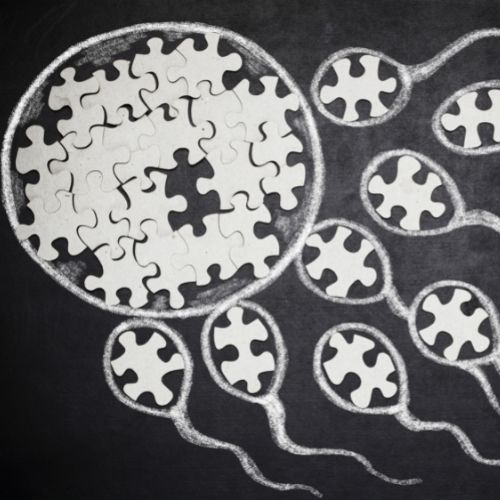
How soon can you get a positive pregnancy test after IUI
I know my first question was, “how soon after IUI can I take a pregnancy test?” The answer really depends on if you took a trigger shot that contains HCG, or human chorionic gonadotropin.
If you had a trigger shot with HCG, you could get a false positive home pregnancy test. That’s because home pregnancy tests detect HCG in the urine.
To be safe, it’s recommended to wait until 2 weeks after your IUI to take a pregnancy test. This would mean you are at least 4 weeks pregnant and the fertility drugs are not causing a false positive. You may be able to get a true positive pregnancy test a few days earlier than 2 weeks.
Your fertility clinic will also want to get a blood test that measures HCG levels and progesterone levels. This is a pregnancy hormone that should continue rising in the first few weeks of pregnancy. A positive result would mean you are definitely pregnant and it is the most accurate result!
If you did not do a trigger shot, you may be able to test as early as 10 days after your IUI. It would be very early to get a positive test, so don’t be discouraged. If it is negative, wait a few days and try again! I recommend using this pregnancy test for early testing.
Urine tests are best done with the first morning urine as it is most concentrated with HCG. Early pregnancy tests, like the First Response Early Response, are more likely to give you an accurate result.
Keep in mind false negatives are very rare. If you get a negative pregnancy test, try to shake it off. It can take several IUI cycles to get pregnant. You can try another IUI treatment after your menstrual cycle.
Related: Tips for Getting Pregnant Fast: A Guide to Tracking Ovulation and Fertility
Testing before the two week wait
Some women like to “test out” their trigger shot. Basically, a week after your IUI, you start taking home urine pregnancy tests.
I cannot emphasize this more: you will get a positive pregnancy test, that does not mean you are pregnant! It just means that your body has not gotten rid of all of the trigger shot yet.
To test out your trigger shot, take a urine test every day at the same time. Eventually the line on the test will get lighter and lighter until you get a negative pregnancy test. This means your body has cleared the trigger shot. This typically happens between 10-14 days after your trigger shot.
After you have cleared the trigger shot, meaning you took a test and it was negative, you can trust that a positive pregnancy test means you are pregnant!

If you are going through fertility treatments, good luck! Stay strong and hold on to hope. Find a strong support system and lean on them. You can do this!


